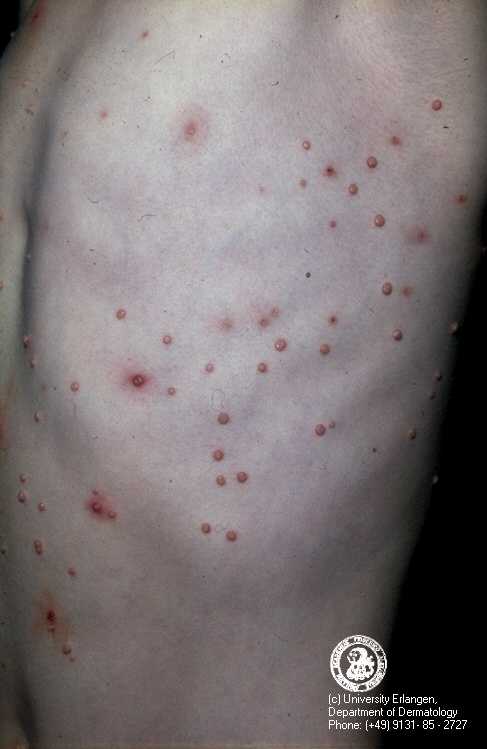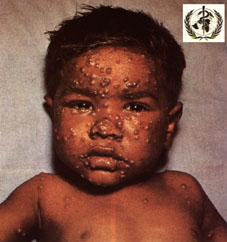UPDATE
Since the eradication of smallpox, the most alarming developments have
been the rise in the cases of genital molluscum contagiosum. It is
believed that the prevalence of molluscum contagiosum has increased as an
opportunistic infection due to the growing population of immunocompromised
individuals(such as those with HIV disease).

Human monkeypox is a severe smallpox-like illness caused by monkeypox
virus (MPV) which occurs in sporadic outbreaks. Infection is
enzootic among squirrels and monkeys in the
rainforests of western and central Africa . In 1996,
cases of monkeypox were reported from villages in Zaire. The WHO and
CDC investigated and found 511 monkeypox cases since
February of that year. This monkeypox outbreak was the biggest recorded to
date.
Vaccinia virus, that which proved so effective in the eradication of
smallpox, allowed for a new approach to the development of vaccines. Now,
widespread research is being conducted in which genes coding for the
surface proteins of a given virus are inserted into the genome of an
avirulent one. Thus, a live vaccine can be administered. The cells
infected with the vaccine virus will make the surface proteins that will
elicit a humoral and T-cell mediated immune response from the
host.
Advantages of using vaccinia virus as the vector for cloned viral
genes include:
 Large genome which can allow for many gene
insertions
Large genome which can allow for many gene
insertions
 Produced inexpensively
Produced inexpensively
 Relatively stable
Relatively stable
 Delivery by nonmedical persons
Delivery by nonmedical persons
 Cell-mediated immunity is elicited
Cell-mediated immunity is elicited
However, some disadvantages include:
 Rare serious side effects with regular vaccinia
virus vaccine have been observed
Rare serious side effects with regular vaccinia
virus vaccine have been observed
 Revaccination with vaccinia vector within 5 years
may be unreliable
Revaccination with vaccinia vector within 5 years
may be unreliable

Rare complications can cause vaccinial rash, similar to
smallpox.
A current debate is raging among scientists about whether the remaining
stores of smallpox virus should be destroyed. With the ever-present
threat of biological warfare, the discussions have intensified. If you
would like to read some of the arguments in the debate, click
here.
Back to Pox Home Page


 Large genome which can allow for many gene
insertions
Large genome which can allow for many gene
insertions Produced inexpensively
Produced inexpensively Relatively stable
Relatively stable Delivery by nonmedical persons
Delivery by nonmedical persons Cell-mediated immunity is elicited
Cell-mediated immunity is elicited Rare serious side effects with regular vaccinia
virus vaccine have been observed
Rare serious side effects with regular vaccinia
virus vaccine have been observed Revaccination with vaccinia vector within 5 years
may be unreliable
Revaccination with vaccinia vector within 5 years
may be unreliable